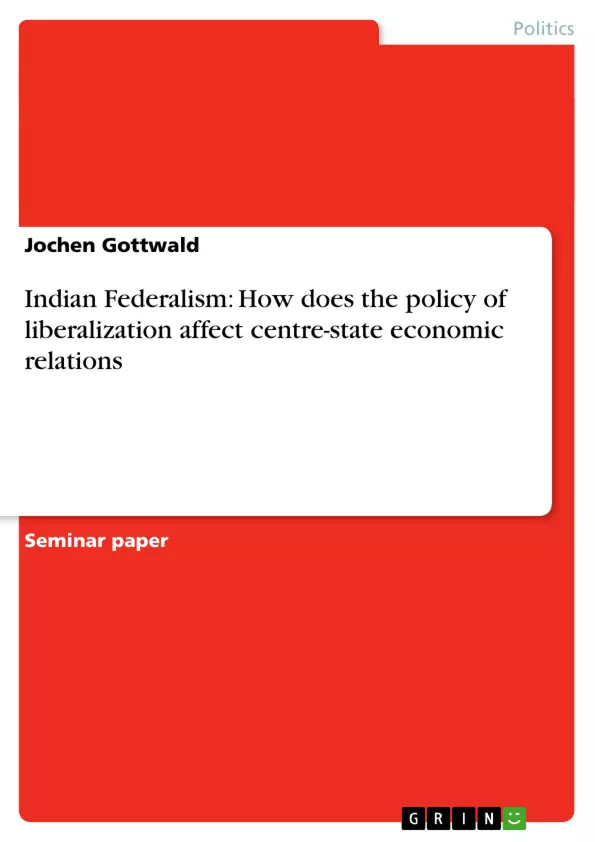Many scholars expected India to drag her feet in the liberalization process, due to the opposition of economically weak groups, negatively affected by a globalized market economy, but politically empowered through institutions created by India′s long democratic tradition (Lanyi 2000). The missing of this resistance was one of the most puzzling experiences of the last ten years.
Supplementing Rob Jenkins′ popular thesis that India is going through a "reform by stealth" (Jenkins 1999) led by witty politicians, perfectly able to play the tunes of these various institutions, this article will provide a neo-institutionalist position with emphasize on the impact of the IMF′s structural adjustments programme on the federal and local level, which led to a change in the formal as well as in the informal institutions themselves. There are four points in Jenkins′ approach open to criticism and able to undermine the achievements of his research:
a) the reductionist and static understanding of institutions
b) the neglect of international entrepreneurs and structure influencing institutional policy
c) the neglect of specific Indian "realities", forcing institutions to adapt in the face of liberalization
d) the overemphasizing on the relevance of informal institutions and corruption as a means to achieve desired political outcomes.
The thesis provided in this essay will be that the observed shift towards an increased directive ability of the central government is only a short-term phenomenon masking a steadily accelerating devolution of power that capacitates state- and local authorities to autonomously negotiate their self-interest in a globalized world over the long run. This process not only leads to an obvious need to redesign fiscal federalism, but will also call for an abolition of several centre-favouring precautions of Indian federalism.
Inhaltsverzeichnis (Table of Contents)
- Introduction
- Institutions as norms, rules and modes of political transaction
- A model for institutional change
- Institutional Functionality
- Effects of changes in external structure
- An index for reform incentives
- Informal institutions
- Incentives of IMF structural adjustments and free trade on reform measures
- The reform of India's centric federalism since 1990
- Conclusion
Zielsetzung und Themenschwerpunkte (Objectives and Key Themes)
This article aims to provide a neo-institutionalist perspective on the impact of the IMF's structural adjustments programme on the federal and local level in India, focusing on how these adjustments led to a shift in both formal and informal institutions. It examines the liberalization process in India, particularly the role of institutions and the relationship between the central government and states.
- The impact of IMF structural adjustments on India's federal and local institutions
- The role of formal and informal institutions in the liberalization process
- The relationship between the central government and states in the context of liberalization
- The evolving nature of institutions in response to external structural changes
- The impact of globalized market economy on Indian federalism
Zusammenfassung der Kapitel (Chapter Summaries)
- Introduction: This chapter sets the scene for the article by outlining the economic situation in India during the 1990s, leading to the liberalization process and the adoption of free trade policies. It introduces the central question of how liberalization affects center-state economic relations and highlights the contrasting views on the potential for resistance to liberalization.
- Institutions as norms, rules and modes of political transaction: This chapter explores the concept of institutions as rules of the game, shaping the actions of political actors and reducing transaction costs. It emphasizes that institutions are dynamic, subject to change based on evolving norms, attitudes, and political structures.
- A model for institutional change: This chapter presents a framework for understanding institutional change. It outlines the assumption that changes in external structure impact institutional functionality, and it defines institutional functionality as a combination of legislative and political efficiency.
- Institutional Functionality: This section further elaborates on the concept of institutional functionality, defining it as the combined efficiency of legislative and political processes. It highlights how legislative efficiency sets the stage for political action, while political efficiency adapts to legislative conditions or fills in gaps.
Schlüsselwörter (Keywords)
The key terms and concepts explored in this text include Indian federalism, liberalization, structural adjustments, IMF, institutions, formal and informal institutions, center-state economic relations, globalized market economy, legislative and political efficiency, institutional change, and reform incentives. These concepts are crucial for understanding the interplay between economic reforms and political structures in India.
Frequently Asked Questions
How did liberalization affect Indian federalism?
Liberalization initiated a shift towards the devolution of power, allowing state and local authorities to negotiate their interests more autonomously in a globalized economy.
What was the impact of the IMF structural adjustments?
The IMF programme led to significant changes in both formal and informal institutions in India, driving market-oriented reforms at multiple levels of government.
What is "reform by stealth" in the Indian context?
It is a thesis by Rob Jenkins suggesting that Indian politicians implemented reforms quietly to avoid resistance from groups negatively affected by globalization.
How are institutions defined in this neo-institutionalist perspective?
Institutions are viewed as dynamic norms, rules, and modes of political transaction that shape the actions of political actors and reduce transaction costs.
What is institutional functionality?
It is defined as the combination of legislative and political efficiency, which determines how well an institution can adapt to external structural changes.
- Quote paper
- Jochen Gottwald (Author), 2003, Indian Federalism: How does the policy of liberalization affect centre-state economic relations, Munich, GRIN Verlag, https://www.grin.com/document/18801



